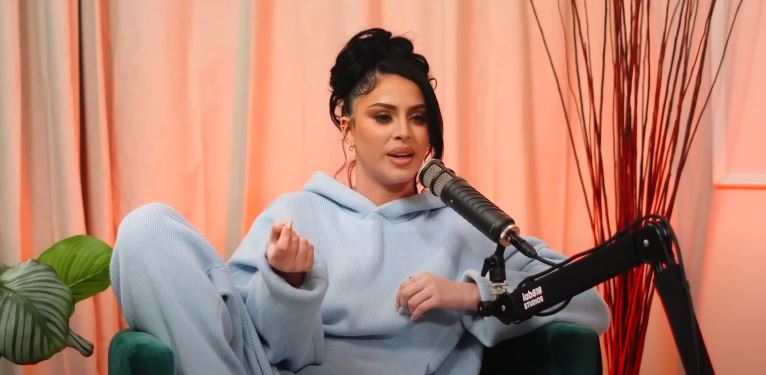In addition to her viral content and comedic prowess, Camilla Araujo has been gaining more and more attention for the open way she showcases her private life. Her relationship with boyfriend Owen Lynch, which is widely shared on TikTok and Instagram, is turning into a case study of how contemporary couples deal with exposure while remaining vulnerable and humorous. She is offering something much more relatable than a carefully manicured ideal: the genuine charm of two people working things out together while basking in the warm glow of the internet.
After sharing a humorous video in which she jokes, “I think my boyfriend is broke,” she suddenly shares a heartfelt response to his public endorsement of her OnlyFans success. These changes, which are partially staged and partially genuine, feel remarkably like the ups and downs of actual relationships. Camilla is rewriting the digital love story format with subtlety and humor by bringing her audience into that dynamic.
| Camilla Araujo – Bio, Career, and Personal Info | |
|---|---|
| Full Name | Camilla Araujo |
| Date of Birth | May 1, 2002 |
| Age | 22 (as of 2025) |
| Nationality | Brazilian-American |
| Boyfriend | Owen Lynch |
| Profession | Influencer, Content Creator, Actress |
| Popular Platform | Instagram – @realcamillaara |
| Followers (Instagram) | 4 Million+ |
| Notable Work | *Oração do Amor Selvagem* (film) |
| Verified Source | Famous Birthdays |
Araujo has broadened her content strategy in recent months, incorporating her romantic life into her online persona with ease. Her posts with Owen Lynch are refreshingly unscripted, informal, and quirky rather than glamorized. She provides more than just amusement by using personal storytelling to shed light on contemporary relationship dynamics, particularly among Gen Z. Her use of comedy to examine themes of partnership, emotional vulnerability, and financial inequality is especially creative.
In one particularly noteworthy post, she suggests her boyfriend might be “broke” while side-eyeing the camera. Others saw it as a clever skit—an ironic play on the “gold digger” cliché—that subverted rather than reinforced expectations, while others took it at face value. One video at a time, Araujo has been destroying stereotypes with strategic satire. That degree of narrative control works incredibly well to uphold audience confidence and promote constructive dialogue.

Transparency seems to be a philosophy for Araujo rather than just a content strategy. There’s a mutual respect that comes through whether she’s making jokes about Owen’s spending patterns or complimenting him on his support of her OnlyFans platform. This candid depiction of a developing relationship feels incredibly clear and profoundly human in a digital environment that frequently rewards perfectionism.
Camilla capitalizes on a broader trend among influencers: the shift away from glitzy lifestyles toward content that reflects genuine emotional truths by demonstrating that humor and honesty can coexist. The shifting tastes of the audience have greatly accelerated this change. Because of this, viewers are more interested in creators who are authentically themselves—flawed, humorous, and essentially relatable.
Camilla’s ability to strike a balance between agency and vulnerability is what makes her unique. Even when the comments section erupts, she never lets the story slip from her grasp. She remains true to her mission—to entertain, to express, and to connect—whether she is questioned for her satire or praised for her authenticity.
Owen Lynch, her boyfriend, is becoming a sort of co-star—not as a polished influencer, but as a charming character whose genuineness only enhances the narrative. His easygoing manner and willingness to comply give their shared story more nuance. His recurring role is sufficient to keep the audience interested in their relationship, even though he doesn’t control her content.
Araujo is promoting a novel influencer storytelling paradigm with this strategy. She is incorporating personal relationships into public life in ways that feel natural and, surprisingly, educational rather than separating them. Her decision to put emotional clarity first is particularly refreshing in the context of creator culture, where brand deals and metrics frequently dictate behavior.
Her approach also points to a larger cultural shift: content producers taking on the function of social commentators. She encourages her audience to consider the financial roles in relationships, the emotional support in entrepreneurship, and even the subtle power dynamics in dating by using her personal experiences as conversation starters. It is very effective at producing informative as well as entertaining content.
The way that the general public views influencers has changed significantly in recent years. Creators like Camilla, who emphasize the commonplace eccentricities and real-life moments that genuinely make relationships sustainable, have significantly undermined the façade of the “perfect couple.” Her content is changing the norms for online love stories, whether it’s by joking about common fears or acknowledging minor triumphs.
Her fans were particularly struck by Lynch’s public acclaim of her success on OnlyFans, a site that is still fraught with stigma, particularly for women. In addition to being romantic, his straightforward but encouraging gesture was representative of how contemporary relationships are changing conventional gender roles. It illustrated the possibility of redefining emotional partnership as one that is proud, encouraging, and publicly affirming.
